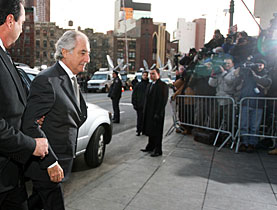Papers see Madoff sentence as just the beginning

The day after a judge gave the biggest swindler Wall Street has ever suffered 150 years in jail, Swiss media turned to the lessons learned from the Madoff affair.
The country’s major newspapers mostly expounded on the symbolic nature of the enormous sentence that US District Judge Denny Chin handed to financial criminal Bernard Madoff for swindling $13 billion from more than 13,000 clients since 1995. Total investments in his Ponzi scheme are estimated at $64.8 billion.
Indeed, even Chin himself said the sentence on 11 charges of fraud and other crimes was meant to make an example out of Madoff, who at 71 years old, is statistically expected to live another 13 years. Defence lawyers had asked for a 12-year sentence, while prosecutors asked for 150 years.
“Here the message must be sent that Mr Madoff’s crimes were extraordinarily evil,” Chin told a courtroom that erupted into applause when the sentence was announced.
The massive sentence, the stiffest allowed by law in this case, means Madoff will never be eligible for parole.
“No mercy for Bernie Madoff,” wrote Bern’s Bund newspaper.
Draconian
“To be sure, the imposed imprisonment is draconian,” added the Tages-Anzeiger, “but the judgment just scratches the surface”.
The Zurich-based newspaper, like other media, said that few believe Madoff’s pyramid scheme – in which investors were paid with money from other investors instead of with genuine profits – could have run such a massive scam without additional people knowingly working on the inside. Some expect another ten to 20 people to be charged, though Madoff has insisted he alone is responsible for his crimes.
The real tragedy, said the Neue Zurcher Zeitung, was in making “a dream investment seemingly real” that duped so many professionals with returns that were consistently several percentage points above average rates. Under a headline, “A sentence with symbolic meaning” the Zurich-based newspaper called the affair “diabolical”.
How could it happen? The NZZ said the “crafty fraudster” had “hoodwinked” scores of investors with a level of deception that was staggering and committed.
“He didn’t from time to time slip into illegal activity to camouflage a few mistakes in the hope of finding a way back later into legality,” the paper wrote. “How much criminal energy came into play is demonstrated by the $65 billion.”
Outrage
Le Temps newspaper said the sentence reflects as much the scope of the scheme as the outrage of the American public at a “rip-off that has come to symbolize the excesses of Wall Street”.
The paper ran a front page cartoon of a newly jailed Madoff speaking with a cellmate named Joey. “I robbed two banks. And you?” Joey asks. “All of them,” the Madoff character replies.
End of story? “Hardly,” Le Temps continues, before questioning the level of supervision the Securities and Exchange Commission (SEC) brought to the affair.
“It would seem easy after the fact to accuse a financier for having trusted [Madoff]”, the paper writes, before quickly reminding readers that the scheme was so slick that “even the stock exchange investigators couldn’t find fault”.
The paper mentions that inquiries in 2005 and 2007 into Madoff’s firm “followed the wrong track” when it turned its attention to “front running”, an illegal practice of a brokerage using knowledge of its own customers’ pending orders to make advanced trades. As one lawyer said, blame could fall on financial advisers “for being stupid but that’s not a crime”.
“But the source of the problem is elsewhere,” Le Temps added. “It’s not so much the blindness of these [financial advisers] that justice must reveal, but the bundle of personal interests that led them to entrust so much of their clients wealth with Bernard Madoff.”
“Only criminal complaints could shed light on the complex system of commissions – that often vanish in off shore accounts – that allowed a galaxy of Madoff intermediaries to make a fortune,” it said. “It’s a question of not simply revealing the drive behind the swindle of the century but also shedding light on one of the darkest sides of the financial system.”
“With a little more SEC clear-sightedness the damages probably could have been limited.”
Tim Neville, swissinfo.ch
Number of Madoff clients: 13,555
Total investments: $64.8 billion
Investor net loss since 1995: $13 billion
Madoff’s prisoner number: 61727-054
The 150-year sentence handed to 71-year-old Madoff may seem like overkill, but it is not the longest sentence for a white-collar crime ever levied in a US court.
While Madoff was guilty of 11 counts of fraud and other charges, in 2000, Sholman Weiss was found guilty on 78 charges of wire fraud, money laundering and racketeering. The head of a failed firm called National Heritage Life was sentenced in absentia to 845 years. Another man received 740 years for his involvement in the firm’s collapse. Sholman, who was eventually extradited from Austria, has maintained he is innocent.
Bernard Madoff founded Bernard L Madoff Investment Securities on Wall Street in 1960. He started the fraudulent Ponzi scheme in the 1990s.
The scheme attracted approximately $65 billion of funds by the time the fraud was discovered in December 2008. Madoff ran the fund as an exclusive club, attracting money from Jewish charities and a host of wealthy people, including Steven Spielberg, according to reports.
The fund was run with strict secrecy and ran internal audits. Many financial institutions sounded alerts about a possible Ponzi scheme, but regulators admitted that they did not investigate these warnings thoroughly enough.
On December 10, 2008, Madoff was arrested in the US after allegedly admitting to his sons that the scheme was “one big lie”.
In March, Madoff pleaded guilty in court to 11 charges including fraud, perjury and money laundering. He said he was “deeply sorry and ashamed”.
Madoff was sentenced to 150 years in prison on June 29.
Charges have also been laid against alleged accomplices in the fraud.

In compliance with the JTI standards
More: SWI swissinfo.ch certified by the Journalism Trust Initiative











You can find an overview of ongoing debates with our journalists here . Please join us!
If you want to start a conversation about a topic raised in this article or want to report factual errors, email us at english@swissinfo.ch.